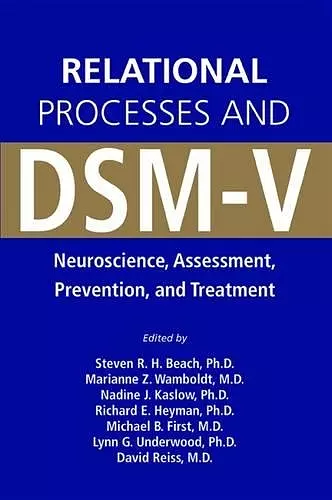Relational Processes and DSM-V
Neuroscience, Assessment, Prevention, and Treatment
Michael B First editor David Reiss editor Steven R Beach editor Marianne Z Wamboldt editor Nadine J Kaslow editor Richard E Heyman editor Lynn G Underwood editor
Format:Paperback
Publisher:American Psychiatric Association Publishing
Published:18th Aug '06
Currently unavailable, and unfortunately no date known when it will be back

Seeking to integrate the large volume of clinical research on relational processes and mental health disorders with other scientific advances in psychiatry, Relational Processes and DSM-V builds on exciting advances in clinical research on troubled relationships. These advances included marked improvements in the assessment and epidemiology of troubled relationships as well the use of genetics, neuroscience, and immunology to explore the importance of close relationships in clinical practice. Advances in family-based intervention, and prevention are also highlighted to help practitioners and researchers find common ground and begin an empirically based discussion about the best way to revise the DSM. Given the overwhelming research showing that relationships play a role in regulating neurobiology and genetic expression and are critical for understanding schizophrenia, conduct disorder, and depression among other disorders, relational processes must be a part of any empirically based plan for revising psychiatric nosology in DSM-V.
The chapters in this book counter the perspective that we can safely discard the biopsychosocial model that has guided psychiatry in the past. The contributors examine the relevance of close relationships in such issues as the basic psychopathology of mental disorders, factors influencing maintenance and relapse, sources of burden for family members, and guiding family-based interventions. By tying relational processes to basic research on psychopathology, they demonstrate the value of integrating basic behavioral and brain research with a sophisticated understanding of the self-organizing and self-sustaining characteristics of relationships. Coverage includes:
• research linking relational processes to neuroscience, neurobiology, health outcomes, intervention research, prevention research, and genetics
• consideration of specific circumstances, such as promoting healthy parenting following divorce and relational processes in depressed Latino adolescents
• optimal approaches to the assessment of relational processes with clinical significance, such as child abuse, partner abuse, and expressed emotion.
• a simple introduction to the methodology of taxometrics, offering insight into whether key relational processes are distinct categories or continuously distributed variables
• an overview of the links between relational processes and psychiatric outcomes, providing a theoretical foundation for the discussion of links to psychopathology
Together, these contributions seek to develop a shared commitment among clinicians, researchers, and psychopathologists to take seriously the issue of relational processes as they relate to diagnoses within DSM-and to encourage mental health care...
ISBN: 9781585622382
Dimensions: 229mm x 152mm x 14mm
Weight: 422g
293 pages